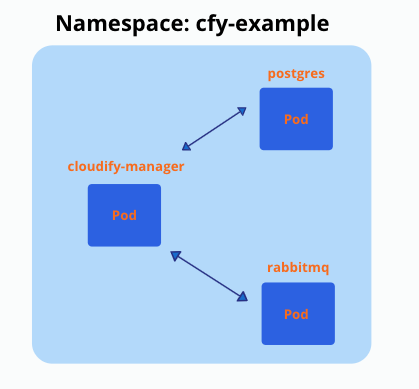Deploying a Cloudify Manager Worker to Kubernetes
Cloudify manager worker helm chart ( Premium Version )
Description
It’s a helm chart for cloudify manager which is:
- Highly available, can be deployed with multiple replicas. ( available only when used NFS like Storage file system )
- Use persistent volume to survive restarts/failures.
- Use external DB (postgress), which may be deployed via public helm chart of Bitnami: https://github.com/bitnami/charts/tree/master/bitnami/postgresql
- Use external Message Brokes (rabbitMQ), which may be deployed via public helm chart of Bitnami: https://github.com/bitnami/charts/tree/master/bitnami
This is how the setup looks after it’s deployed to ‘cfy-example’ namespace (it’s possible to have multiple replicas (pods) of cloudify manager):

How to create and deploy such a setup?
Generate certificate as a secret in k8s.
Deployment of DB (Postgres).
Deployment of Message Broker (rabbitMQ).
Deployment of Cloudify manager worker.
You need to deploy DB and Message Broker before deploying Cloudify manager worker
Generate certificates and add as secret to k8s
SSL certificate must be provided, to secure communications between cloudify manager and posrgress/rabbitmq
ca.crt (to sign other certificates)
tls.key
tls.crt
Option 1: Create certificates using cloudify manager docker container
$ docker pull cloudifyplatform/community-cloudify-manager-aio:latest
$ docker run --name cfy_manager_local -d --restart unless-stopped --tmpfs /run --tmpfs /run/lock -p 8000:8000 cloudifyplatform/community-cloudify-manager-aio
$ docker exec -it created_ID bash
# NAMESPACE to which cloudify-manager deployed, must be changed accordingly
$ cfy_manager generate-test-cert -s 'cloudify-manager-worker.NAMESPACE.svc.cluster.local,rabbitmq.NAMESPACE.svc.cluster.local,postgres-postgresql.NAMESPACE.svc.cluster.local'Create secret in k8s from certificates:
$ kubectl create secret generic cfy-certs --from-file=./tls.crt --from-file=./tls.key --from-file=./ca.crtOption 2: Use cert-manager component installed to kubernetes cluster
You need to deploy those manifests, which will generate cfy-certs secret eventually, you need to change NAMESPACE to your namespace before. You can find this manifest in external folder - cert-issuer.yaml
apiVersion: cert-manager.io/v1alpha2
kind: Issuer
metadata:
name: selfsigned-issuer
spec:
selfSigned: {}
---
apiVersion: cert-manager.io/v1alpha2
kind: Certificate
metadata:
name: cfy-ca
spec:
secretName: cfy-ca-tls
commonName: NAMESPACE.svc.cluster.local
usages:
- server auth
- client auth
isCA: true
issuerRef:
name: selfsigned-issuer
---
apiVersion: cert-manager.io/v1alpha2
kind: Issuer
metadata:
name: cfy-ca-issuer
spec:
ca:
secretName: cfy-ca-tls
---
apiVersion: cert-manager.io/v1alpha2
kind: Certificate
metadata:
name: cfy-cert
spec:
secretName: cfy-certs
isCA: false
usages:
- server auth
- client auth
dnsNames:
- "postgres-postgresql.NAMESPACE.svc.cluster.local"
- "rabbitmq.NAMESPACE.svc.cluster.local"
- "cloudify-manager-worker.NAMESPACE.svc.cluster.local"
- "postgres-postgresql"
- "rabbitmq"
- "cloudify-manager-worker"
issuerRef:
name: cfy-ca-issuerInstall PostgreSQL(bitnami) to Kubernetes cluster with helm
You can find example of PostgreSQL values.yaml in external/postgres-values.yaml
Use certificate we created as k8s secret: ‘cfy-certs’
volumePermissions.enabled=true
tls:
enabled: true
preferServerCiphers: true
certificatesSecret: 'cfy-certs'
certFilename: 'tls.crt'
certKeyFilename: 'tls.key'Install postgresql with postgres-values.yaml
helm install postgres bitnami/postgresql -f ./cloudify-manager-worker/external/postgres-values.yaml -n NAMESPACEInstall RabbitMQ(bitnami) to Kubernetes cluster with helm
Use certificate we created as k8s secret: ‘cfy-certs’
tls:
enabled: true
existingSecret: cfy-certs
failIfNoPeerCert: false
sslOptionsVerify: verify_peer
caCertificate: |-
serverCertificate: |-
serverKey: |-Run management console on 15671 port with SSL (cloudify manager talks to management console via SSL):
add to rabbitmq-values.yaml
configuration: |-
management.ssl.port = 15671
management.ssl.cacertfile = /opt/bitnami/rabbitmq/certs/ca_certificate.pem
management.ssl.certfile = /opt/bitnami/rabbitmq/certs/server_certificate.pem
management.ssl.keyfile = /opt/bitnami/rabbitmq/certs/server_key.pem
extraPorts:
- name: manager-ssl
port: 15671
targetPort: 15671Install rabbitmq with rabbitmq-values.yaml
helm install rabbitmq bitnami/rabbitmq -f ./cloudify-manager-worker/external/rabbitmq-values.yaml -n NAMESPACEInstall cloudify manager worker
helm repo add cloudify-helm https://cloudify-cosmo.github.io/cloudify-helm
helm install cloudify-manager-worker cloudify-helm/cloudify-manager-worker -f ./cloudify-manager-worker/values.yaml -n NAMESPACEUpgrade cloudify manager worker
To upgrade cloudify manager use ‘helm upgrade’.
For example to change to newer version (from 5.3.0 to 6.2.0 in this example),
Change image version in values.yaml:
Before:
image:
repository: cloudifyplatform/premium-cloudify-manager-worker
tag: 5.3.0After:
image:
repository: cloudifyplatform/premium-cloudify-manager-worker
tag: 6.2.0Run ‘helm upgrade’
helm upgrade cloudify-manager-worker cloudify-helm/cloudify-manager-worker -f ./cloudify-manager-worker/values.yaml -n NAMESPACEIf DB schema was changed in newer version, needed migration will be running first on DB, then application will be restarted during upgrade - be patient, because it may take a couple of minutes.
Configuration options of cloudify-manager-worker values.yaml:
Image:
image:
repository: cloudifyplatform/premium-cloudify-manager-worker
tag: 6.2.0
## Specify a imagePullPolicy
## Defaults to 'Always' if image tag is 'latest', else set to 'IfNotPresent'
## ref: http://kubernetes.io/docs/user-guide/images/#pre-pulling-images
##
pullPolicy: IfNotPresent
## Optionally specify an array of imagePullSecrets.
## Secrets must be manually created in the namespace.
## ref: https://kubernetes.io/docs/tasks/configure-pod-container/pull-image-private-registry/
##
pullSecrets: []
# - name: secretName
initContainer:
repository: busybox
tag: latest
pullPolicy: AlwaysDB - postgreSQL:
db:
host: postgres-postgresql
cloudifyDBName: 'cloudify_db'
cloudifyUsername: 'cloudify'
cloudifyPassword: 'cloudify'
serverDBName: 'postgres'
serverUsername: 'postgres'
serverPassword: 'cfy_test_pass'Message Broker - rabbitmq:
queue:
host: rabbitmq
username: 'cfy_user'
password: 'cfy_test_pass'Service:
service:
host: cloudify-manager-worker
type: ClusterIP
name: cloudify-manager-worker
http:
port: 80
https:
port: 443
internalRest:
port: 53333node selector - select on which nodes cloudify manager AIO may run:
nodeSelector: {}
# nodeSelector:
# nodeType: onDemand Secret name of certificate
##
## TLS configuration
##
tls:
# certificates as a secret, to secure communications between cloudify manager and postgress|rabbitmq
secretName: cfy-certsresources requests and limits:
resources: {}
# requests:
# memory: 0.5Gi
# cpu: 0.5
# limits:
# memory: 0.5Gi
# cpu: 0.5Persistent volume size for EBS/EFS:
If using multiple replicas (High availability), NFS like Storage like EFS must be used
volume:
storage_class: 'efs'
access_mode: 'ReadWriteMany'
size: "3Gi"If using one replicas, you can use EBS (gp2) for example, gp2 is default:
volume:
storage_class: 'gp2'
access_mode: 'ReadWriteOnce'
size: "3Gi"readiness probe may be enabled/disabled
readinessProbe:
enabled: true
port: 80
path: /console
initialDelaySeconds: 10license - relevant in case you use premium cloudify manager,not community
You can add license as secret to k8s
licence:
secretName: cfy-licenceConfig
You can delay start of cfy manager / install all plugins / disable security (not recommended)…
config:
# Multiple replicas works only with NFS like volume
replicas: 1
startDelay: 0
installPlugins: false
cliLocalProfileHostName: localhost
security:
sslEnabled: false
adminPassword: admin
tlsCertPath: /mnt/cloudify-data/ssl/tls.crt
tlsKeyPath: /mnt/cloudify-data/ssl/tls.key
caCertPath: /mnt/cloudify-data/ssl/ca.crtLicense
licence: {}
# secretName: cfy-licenceIngress
You may enable ingress-nginx and generate automatically cert if you have ingress-nginx / cert-manager installed.
ingress:
enabled: false
host: cloudify-manager.app.cloudify.co
annotations:
kubernetes.io/ingress.class: nginx
# cert-manager.io/cluster-issuer: "letsencrypt-prod"
tls:
enabled: false
secretName: cfy-secret-name